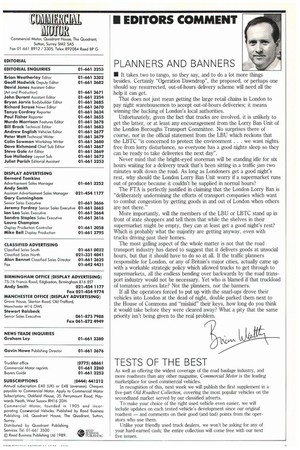PLANNERS AND BANNERS
Page 5

If you've noticed an error in this article please click here to report it so we can fix it.
• It takes two to tango, so they say, and to do a lot more things besides. Certainly "Operation Dawndrop", the proposed, or perhaps one should say resurrected, out-of-hours delivery scheme will need all the help it can get.
That does not just mean getting the large retail chains in London to pay night warehousemen to accept out-of-hours deliveries; it means winning the backing of London's local authorities.
Unfortunately, given the fact that trucks are involved, it is unlikely to get the latter, or at least any encouragement from the Lorry Ban Unit of the London Boroughs Transport Committee. No surprises there of course, nor in the official statement from the LBU which reckons that the LBTC "is concerned to protect the environment. . . we want nights free from lorry disturbance, so everyone has a good nights sleep so they can be ready to take deliveries the next day".
Never mind that the bright-eyed storeman will be standing idle for six hours waiting for a delivery truck that's been sitting in a traffic jam two minutes walk down the road. As long as Londoners get a good night's rest, why should the London Lorry Ban Unit worry if a supermarket runs out of produce because it couldn't he supplied in normal hours?
The FTA is perfectly justified in claiming that the London Lorry Ban is "deliberately undermining the efforts of transport companies which want to combat congestion by getting goods in and out of London when others are not there."
More importantly, will the members of the LBU or LBTC stand up in front of irate shoppers and tell them that while the shelves in their supermarket might be empty, they can at least get a good night's rest? Which is probably what the majority are getting anyway, even with trucks driving past their homes.
The most galling aspect of the whole matter is not that the road transport industry has dared to suggest that it delivers goods at unsocial hours, but that it should have to do so at all. If the traffic planners responsible for London, or any of Britain's major cities, actually came up with a workable strategic policy which allowed trucks to get through to supermarkets, all the endless bending over backwards by the road transport industry would not be necessary. Yet who is blamed if that truckload of tomatoes arrives late? Not the planners, nor the banners.
If all the operators forced to put up with the snarl-ups drove their vehicles into London at the dead of night, double parked them next to the House of Commons and "mislaid" their keys, how long do you think it would take before they were cleared away? What a pity that the same priority isn't being given to the real problem.
























































































































